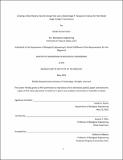Creating a New Malaria Vaccine Design that uses a Blood Stage P. falciparum Chassis for Non-Blood Stage Antigen Presentation
Author(s)
Parker, Shelbi Nicole
DownloadThesis PDF (3.603Mb)
Advisor
Niles, Jacquin C.
Terms of use
Metadata
Show full item recordAbstract
Malaria is a global disease that affects millions annually and the complex life cycle of the Plasmodium species that cause malaria results in increasing drug resistance and poor vaccine efficacy. Current vaccine designs focus on a single stage in the parasite life cycle and antibody responses are inefficient in offering protection, leading to “malaria rebound” as a lack of immune response to multiple stages of the life cycle result in case numbers returning to their levels before intervention. In this work, we utilize a blood stage parasite to present infection and transmission stage antigens. Plasmids using the conditional translation repressor system TetR-DOZI were created, and transgenic parasites that express the scaffold protein eTRAMP4 fused to either CSP or P25 were generated. We assessed the transgenic parasites for growth defects, proper fusion length, and localization to the parasitophorous vacuolar membrane. We also removed parasites from host red blood cells and examined two purification methods in the pipeline of developing a pure, intact culture of transgenic parasites. The methods and results of this work set the stage for a new malaria vaccine design that has the potential to fill the gap of current vaccine technologies.
Date issued
2022-05Department
Massachusetts Institute of Technology. Department of Biological EngineeringPublisher
Massachusetts Institute of Technology